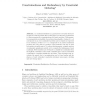113
Voted
ICTAI
2002
IEEE
15 years 5 months ago
2002
IEEE
(Appears as a regular paper in the proceedings of IEEE International Conference on Tools with Artificial Intelligence (ICTAI), IEEE Computer Society, Washington D.C. Nov. 2002, p...
130
Voted
ICSOC
2003
Springer
15 years 5 months ago
2003
Springer
Abstract. Web portals provide an efficient gateway to a broad range of Eservices, resources and information. Web portals need to evolve towards being adaptive in nature, so that th...
92
Voted
CP
2003
Springer
15 years 5 months ago
2003
Springer
Abstract. This paper offers a critique of the framework of Constraint Satisfaction Problems. While this framework has been successful in studying search techniques, and has inspire...
104
Voted
CP
2003
Springer
15 years 5 months ago
2003
Springer
Constraint satisfaction has been applied with great success in closed-world scenarios, where all options and constraints are known from the beginning and fixed. With the internet,...
94
Voted
CP
2003
Springer
15 years 5 months ago
2003
Springer
A reason to distribute constraint satisfaction is privacy: agents may not want to share their values, and they may wish to keep constraints as private as possible. In this paper, w...
IAT
2003
IEEE
15 years 5 months ago
2003
IEEE
With the increasing use of the internet, many problemsolving tasks such as resource allocation, scheduling, planning, and configuration pose themselves in an open setting involvi...
122
click to vote
WLP
2004
Springer
15 years 5 months ago
2004
Springer
Constraint programming provides a declarative approach to solving combinatorial (optimization) problems. The user just states the problem as a constraint satisfaction problem (CSP)...
95
Voted
IBERAMIA
2004
Springer
15 years 5 months ago
2004
Springer
Abstract. In constraint satisfaction, a general rule is to tackle the hardest part of a search problem first. In this paper, we introduce a parameter (τ) that measures the constr...
ECAI
2004
Springer
15 years 5 months ago
2004
Springer
We present a new conceptual abstraction in symmetry breaking – the GE-tree. The construction and traversal of a GE-tree breaks all symmetries in any constraint satisfaction or si...
ECAI
2004
Springer
15 years 5 months ago
2004
Springer
Distributed constraint satisfaction, in its most general acceptation, involves a collection of agents solving local constraint satisfaction subproblems, and a communication protoco...


